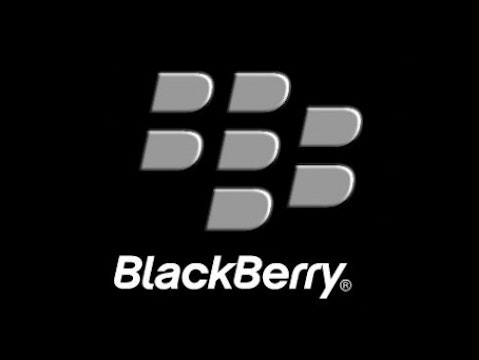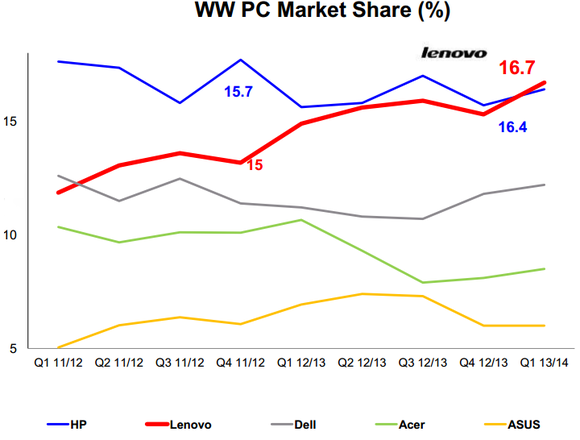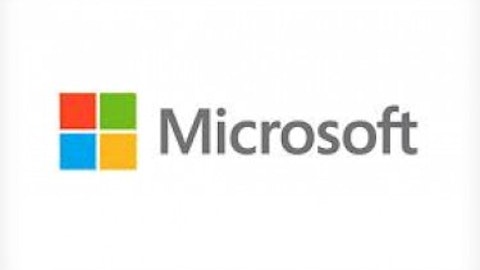Beijing-based Lenovo Group Limited (ADR) (OTCMKTS:LNVGY), the world’s largest PC vendor by shipments, has improved profitable growth across its core PC business and mobile division this year. Its transformation into a PC Plus company proved lucrative as smartphone and tablet sales exceeded expectations for the quarter. The company’s new line of smart-connected devices has compensated for lost laptop and desktop sales in the sluggish PC market. Lenovo Group Limited (ADR) (OTCMKTS:LNVGY) seeks to expand its PC Plus strategy into new mature and developing markets to better position the company against competitors such as Apple and Samsung.

PC Division
Lenovo Group Limited (ADR) (OTCMKTS:LNVGY) recorded revenues of US $8.8 billion for the first fiscal quarter ended June 30, up 10% year-over-year. Net profit rose 23% to US $174 million or US $1.67 earnings per share. Laptop sales increased 4.7% year-over-year to US $4.5 billion, or 52% of total revenue—representing the largest slice of the company’s revenues. Desktop PC sales fell 2.8% year-over-year to US $2.5 billion, or 28% of total revenue.
Despite poor desktop PC sales for the quarter, Lenovo Group Limited (ADR) (OTCMKTS:LNVGY) has outperformed the PC market for 17 consecutive quarters and topped HP and Dell to become the world’s largest PC vendor. The company’s PC market share for the first fiscal quarter came in at 16.7% on shipments of 12.6 million units, according to research firms Gartner and IDC.

Source: Lenovo
Lenovo Group Limited (ADR) (OTCMKTS:LNVGY) CEO Yang Yuanqing believes his company can still generate growth from the $200 billion PC industry. Lenovo’s ThinkPad and Yoga series, among other touch-enabled Windows laptops with new, innovative form factors have eaten away at HP and Dell’s profits. Lenovo will release its next-generation IdeaPad Yoga product later this year to further distance itself from American PC brands and propel sales.
Lenovo Targets Samsung
Chen Xudong, President of Lenovo China, said the company has been “very much focused on the PC product,” but “today we [Lenovo] are entering a new era called PC Plus.” PC Plus represents smartphones and tablets. Lenovo’s shift into mobile has proved lucrative through solid execution of its aggressive predatory pricing strategy. The company’s smartphone and tablet sales increased 105% year-over-year to US $1.2 billion, or 14% of total revenue.
Lenovo displaced local rival ZTE Corp. to become the world’s fourth largest smartphone vendor for the first time, behind LG Electronics, Apple and Samsung. Lenovo’s global smartphone sales rose 144% year-over-year, according to research firm Gartner. About 42% of Lenovo’s sales derive from China, where smartphone sales soared 121% from a year ago. Lenovo Group Limited (ADR) (OTCMKTS:LNVGY) beat Chinese rivals with 12.3% market share, behind Samsung‘s 17.6% share.
South Korea-based Samsung topped the worldwide smartphone market with 31.7% market share on shipments of 71.3 million units. The company has refocused its smartphone strategy in the developing markets, specifically in China, where consumers demand mid-to low-end smartphones because of income constraints. If Samsung wants to secure its market dominance, the company needs to carry innovation into its mid- to low-end smartphones with new form factors to differentiate from low-cost Chinese brands.

Source: Lenovo
Liu Jun, senior vice-president of Lenovo, believes Lenovo can overtake Samsung in China within two years with premium products such as the company’s flagship K900 smartphone. In May, Lenovo released the K900 that targets the high-end smartphone segment to compete against Apple’s iPhone and Samsung’s Galaxy S4. Lenovo also broadened its sales channel in China to increase brand awareness and distribution to end-users. The company opened its second flagship store in Beijing and plans to open five more in the next three years.
BlackBerry Talks, Again
Lenovo has struggled to strengthen its sales channels and relationships with telecom operators outside of China. Mr. Yang told the Wall Street Journal that he was searching for acquisition opportunities in both the mobile and PC marketplace to spread his operations into untapped markets. “We believe that the PC industry and the mobile phone industry will continue to consolidate. So Lenovo is definitely in a good position to become an important player. If a target or deal is consistent with Lenovo’s strategy, we would take the opportunity,” he said.
Last week, BlackBerry Ltd (NASDAQ:BBRY)‘s Board of Directors announced that the company formed a Special Committee to investigate strategic alternatives to “enhance value and increase scale in order to accelerate BB10 deployment.” Some alternatives include partnerships, joint ventures and a sale of the company.
BlackBerry Ltd (NASDAQ:BBRY)’s decision comes after disappointing second quarter sales of its BlackBerry 10 devices. The company failed to fuel its subscriber base, market share and sales against Apple’s iPhone and Android-based smartphones. BlackBerry Ltd (NASDAQ:BBRY) shipped 6.8 million smartphones, where only 2.7 million represented BB10 smartphones—shy of the 3.5 million some analysts projected.
BlackBerry Ltd (NASDAQ:BBRY) fell behind Microsoft’s Windows Phone for the first time in the same quarter, becoming the No. 3 global smartphone operating system. BlackBerry 10 OS dropped to fourth and accounted for 2.9% of the worldwide market. Microsoft holds 3.3% share. Google and Apple recorded 79% and 14.2% share, respectively. Last year, BlackBerry controlled 4.9% of the market with 7.7 million smartphones sold.
In January, Lenovo showed interest in BlackBerry Ltd (NASDAQ:BBRY) to boost its mobile business, but nothing materialized. With the latest BlackBerry Ltd (NASDAQ:BBRY) takeover news, some analysts have linked Lenovo to the struggling smartphone company again. Lenovo acquiring BlackBerry is doubtful due to Canadian and U.S regulations. Lenovo would need the authorization from regulators because the transaction exceeds US $344 million.
Security also poses a huge threat to a buyout deal from Lenovo, especially after the 2012 dispute between U.S Congress and Beijing-based Huawei. Congress suspended the smartphone maker after allegations that the Chinese used Huawei’s technologies for espionage purposes. With tighter security measures, Lenovo purchasing BlackBerry Ltd (NASDAQ:BBRY) may be out of the question.
Bottom Line
Lenovo has delivered record revenues, profits, global PC and smartphone market share this year. Solid execution of its aggressive pricing and innovation has helped boost brand awareness and overall growth across mature and developing markets. Lenovo wants to strengthen its sales channels by attacking new markets outside of China through acquisitions. Markets such as the United States and India hold high growth potential for the company’s smartphone and tablet business.
In May, Lenovo opened its first U.S manufacturing facility in North Carolina to bolster its in-house manufacturing capabilities. Lenovo sees an opportunity for long-term growth in the U.S. market and plans to start selling smartphones in the U.S within a year. The company faces stiff competition from Apple and Samsung, but its innovative product portfolio has wooed consumers to the brand.
Mr. Yang said the company aims to sell 50 million smartphones and 10 million tablets this year. He promises the company will launch a series of newly designed tablets and thinner smartphones for the holiday season. Lenovo offers investors an attractive buying opportunity before year-end that may yield high profitable returns in the long-term.
The article Can Lenovo Beat Samsung and Attain Market Dominance? originally appeared on Fool.com and is written by Christopher DeSousa.
Christopher DeSousa has no position in any stocks mentioned. The Motley Fool has no position in any of the stocks mentioned.
Copyright © 1995 – 2013 The Motley Fool, LLC. All rights reserved. The Motley Fool has a disclosure policy.



